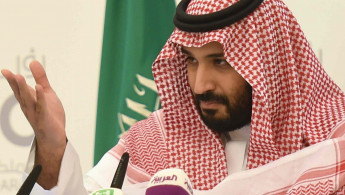Mohammed bin Salman meets with rabbis in New York
Saudi Arabia announced on Thursday that Crown Prince Mohammed bin Salman had met with three Jewish rabbis in New York, Haaretz reported.
Wednesday's meeting included Rabbi Richard Jacobs, president of the Union for Reform Judaism, Rabbi Steven Wernick, head of the United Synagogue of Conservative Judaism and Allen Fagin, vice president of the Orthodox Union.
"The meeting emphasised the common bond among all people, particularly people of faith, which stresses the importance of tolerance, coexistence, and working together for a better future for all of humanity," the Saudi embassy said in a public statement.
This is not the first time a Saudi leader has met with Jewish religious figures. The late King Abdullah sat down with Rabbi Marc Schneier in New York on several occasions.
But observers say that Saudi Arabia is forging closer ties to Jewish leaders and to Israel.
On Sunday, Prime Minister Binyamin Netanyahu said the approval of Air India flights to Israel over Saudi airspace marked a "huge" potential.
Saudi Arabia and Israel have no official diplomatic relations, but the two share a number of strategic interests. Both are close US allies and see Iran as an arch-rival.
Despite Wednesday's meeting, public observance of faiths other than Islam are strictly forbidden in Saudi Arabia. There are no churches or synagogues in the country, and importing non-Islamic symbols is banned.
Prince Mohammed has received praise for recent reforms that promote a more "moderate" version of Islam under his ambitious Vision 2030 plan to transform Saudi society.
Salman has touted reforms - including an end to the ban on women driving - to promote a modernising image of the kingdom that experts say will make it easier to build trade and investment relationships with other countries.
However, the ultra-conservative kingdom maintains a poor human rights record, with its repressive restrictions on women, a brutal ongoing crackdown on dissent and leading a devastating bombing campaign in Yemen which has become the world's worst humanitarian crisis.
Follow us on Twitter: @The_NewArab





 Follow the Middle East's top stories in English at The New Arab on Google News
Follow the Middle East's top stories in English at The New Arab on Google News
![Israeli forces ordered bombed Gaza's Jabalia, ordering residents to leave [Getty]](/sites/default/files/styles/image_330x185/public/2176418030.jpeg?h=a5f2f23a&itok=_YGZaP1z)

